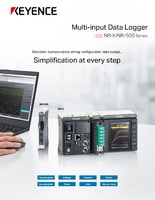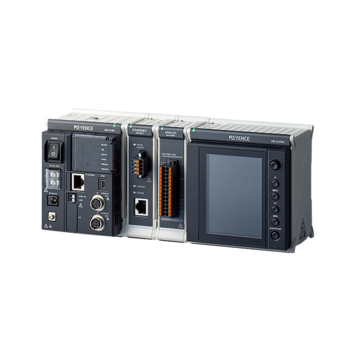Data Acquisition (DAQ)
Temperature Measurement for Plastics Industry
The use of plastics has expanded into nearly all aspects of our lives, ranging from kitchen utensils to industrial and even structural applications. It’s well-known that plastics respond to temperature. Temperature regulation is crucial for molding and manufacturing plastics.
KEYENCE offers a range of thermal monitoring solutions related to automated controls and quality assurance and inspection for the plastics industry. These solutions ensure the plastics are mixed, molded, and injected at the correct temperatures for the end product to meet the required specifications.
Collecting Temperature Data of Mold Temperature Controllers
Controlling the temperature of the molds improves the flow of molten plastics, improves material characteristics, surface finish, reduces surface finish and reduced internal stresses that otherwise cause warping and distortions.
Additionally, maintaining the precise temperature range and using plastics testing equipment during production can help reduce cycle times and improve reproducibility, ensuring consistent results across all product batches. Temperature monitoring is typically done via temperature sensors. KEYENCE’s FT Series digital infrared temperature sensors fit this purpose perfectly, as they provide non-contact measurements with zero risks of contaminating the mold or the material.
Discover more about this product.
Click here to book your demo.

How Temperature Measurement Collection Benefits the Plastics Industry
Besides ensuring quality, temperature measurement can often provide valuable insight into the production process, particularly if the end product doesn’t meet the desired or required quality standards.
This underlines the importance of temperature measurement and control, but also data collection, as it can point towards less-optimized production stages that adversely affect the quality of the product. Data collection in thermometry is typically done by data loggers, which store data for further analysis, or data acquisition systems, which can also trigger certain automated controls if necessary.
Curious about our pricing?
Click here to find out more.

Temperature Measurement Data Loggers for Plastic Manufacturing
KEYENCE’s NR-X100W multi-data logger is the smallest and lightest in its class and features easy operation and compatibility with a variety of measurement applications, including temperature measurements. It works in conjunction with NR-TH08P, a high-accuracy temperature measurement unit with 8-channel inputs and 10 Hz sampling frequency at 24-bit depth.
This ensures that the unit detects and logs even the slightest temperature variations in observed objects by relying on IR sensors and their blackbody radiation detection.
Get detailed information on our products by downloading our catalog.
View Catalog

Understanding Plastic Manufacturing
The manufacturing of thermosetting plastics relies heavily on the chemical dosing of additives, which bond with the resin material during the molding or injection process and then harden. During the curing process, the polymers within the material form an irreversible and unbreakable molecular bond.
Thermoplastics, on the other hand, are much more responsive to temperature as they don’t go through any chemical bonding process during molding and shaping. Unlike thermosets, they can be reheated, reshaped, and recycled without compromising their molecular integrity.
Since these two types of plastic react differently to temperature, the temperature control, measurements, and plastics testing equipment employed must be precise.
We’re here to provide you with more details.
Reach out today!

Benefits of Temperature Measurement in Plastic Manufacturing
Precise temperature measurement and control are crucial in the plastics industry due to the material’s thermal properties. Proper temperature control makes sure that the plastics are processed under optimal conditions, which is essential to preventing material degradation and maintaining the final product's consistent quality.
Additionally, precise temperature measurements and plastic testing equipment ensure the production process, from melting raw materials to cooling (which is also temperature-controlled to avoid defects), is optimized for speed and efficiency. This is particularly true for manufacturing processes, such as injection molding, where the temperature of molten plastic has to be precisely controlled to ensure adequate molding.
Discover more about this product.
Click here to book your demo.

Integrating Temperature Measurement into Plastic Manufacturing Processes
Maintaining precisely controlled temperature, as well as logging temperature variance in the plastics industry, is important for optimizing the manufacturing process and ensuring that the end product meets all the specifications. If you’re interested in integrating KEYENCE solutions into your pre-existing manufacturing line, contact us today!
We’re here to provide you with more details.
Reach out today!



